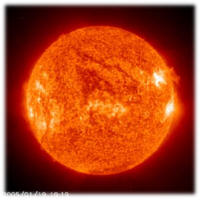
We've used the Sun for drying clothes and food for thousands of years, but only recently have we been able to use it for generating power.
The Sun is 150 million kilometres away, and amazingly powerful.

Just the tiny fraction of the Sun's energy that hits the Earth (around a hundredth of a millionth of a percent) is enough to meet all our power needs many times over.
In fact, every minute, enough energy arrives at the Earth to meet our demands for a whole year - if only we could harness it properly.
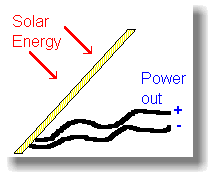 ......................
......................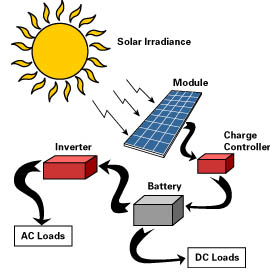
Solar Cells (really called "photovoltaic" or "photoelectric" cells) that convert light directly into electricity. In a sunny climate, you can get enough power to run a 100W light bulb from just one square metre of solar panel.
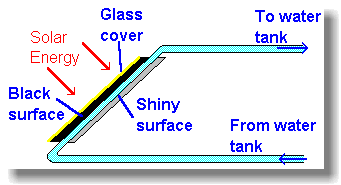
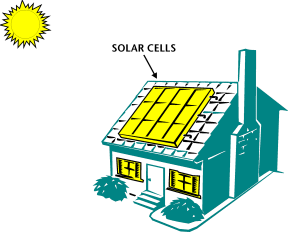
Solar water heating iswhere heat from the sun is used to heat water in glass panels on your roof. This means you don't need to use so much gas or electricity to heat your water at home.
Water is pumped through pipes in the panel. The pipes are painted black, so they get hot when the sun shines on them.
Solar cells provide the energy to run satellites that oribt the Earth. These give us satellite TV, telephones, navigation, weather forecasting, the internet and all manner of other facilities.
One idea that is being considered is to build solar towers.
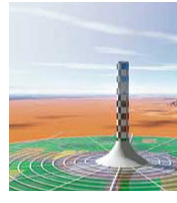 .....
..... 
The idea is very simple - you build a big greenhouse, which is warmed by the Sun. In the middle of the greenhouse you put a very tall tower. The hot air from the greenhouse will rise up this tower, fast - and can drive turbines along the way. This could generate significant amounts of power, especially in countries where there is a lot of sunshine and a lot of room, such as Australia.
ADVANTAGES
Solar energy is free - it needs no fuel and produces no waste or pollution. In sunny countries, solar power can be used where there is no easy way to get electricity to a remote place. It is handy for low-power uses such as solar powered garden lights and battery chargers.
And of course, solar power is renewable. The sun will keep on shining anyway, so it makes sense to use it.
DISADVANTAGES
It doesn't work at night or when it isn't clear and sunny. It is also very expensive to build solar power stations. Solar cells cost a great deal compared to the amount of electricity they'll produce in their lifetime. Solar power can be unreliable unless you're in a very sunny climate. In some places, solar power isn't much use except for low-power applications, as you need a very large area of solar panels to get a decent amount of power.